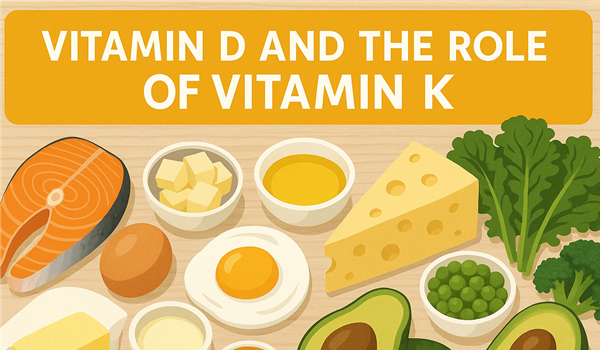Vitamin D and K food sources

Patient Information Leaflet: Vitamin D, Food Sources & the Role of Vitamin K
Kensington Medical Centre – Belfast
⸻
What Is Vitamin D?
Vitamin D helps your body absorb calcium and keep your bones, teeth, and muscles healthy. It also supports your immune system and overall well-being.
⸻
Why Is Vitamin D Important?
Without enough vitamin D, you may be at risk of:
• Weak or soft bones (rickets in children, osteomalacia in adults)
• Muscle aches or weakness
• Feeling tired or run down
• Higher risk of bone fractures
⸻
Who Is at Risk of Low Vitamin D?
You may need more vitamin D if you:
• Spend little time outdoors
• Wear clothing that covers most of your skin
• Have dark skin (as darker skin produces less vitamin D in sunlight)
• Are over 65 years old
• Are pregnant or breastfeeding
• Have certain health conditions (like liver, kidney, or gut disorders)
In the UK, it’s recommended that everyone consider taking a daily 10 microgram (400 IU) vitamin D supplement during the autumn and winter months.
⸻
Food Sources of Vitamin D
Few foods naturally contain vitamin D, but you can find it in:
• Oily fish (salmon, mackerel, sardines, trout)
• Liver
• Egg yolks
• Red meat
• Fortified foods (such as breakfast cereals, spreads, and some plant-based milks)
Note: Most people get the majority of their vitamin D from sunlight, not food.
⸻
What About Vitamin K?
Vitamin K works alongside vitamin D to help your body use calcium properly and support healthy bones. It helps guide calcium into your bones and teeth, and away from soft tissues like arteries.
⸻
Good Food Sources of Vitamin K
• Leafy green vegetables (kale, spinach, cabbage)
• Broccoli and Brussels sprouts
• Olive oil and vegetable oils
• Green peas
• Fermented foods (like natto – a Japanese fermented soybean dish)
Warning for WARFARIN Patients
If you’re taking warfarin, keep your intake of vitamin K foods (like leafy greens) consistent each week.
Avoid vitamin K supplements unless advised by your doctor, as they can affect your blood’s ability to clot.
Warfarin patients inform your GP before making any major diet changes or starting new supplements
⸻
Helpful Tips
• Spend time outdoors safely to boost vitamin D
• Eat oily fish and fortified foods regularly
• Include green leafy vegetables in your diet for vitamin K
• Consider a vitamin D supplement, especially in winter or if you are at risk of deficiency
• Talk to your doctor before taking combined supplements
⸻
When to See a Doctor
Speak to your GP if you:
• Have bone pain or muscle weakness
• Are concerned about your vitamin D levels
• Have a condition that affects nutrient absorption
• Are unsure whether to take supplements
A blood test can check your vitamin D levels, and your doctor can advise on the right supplement for you.
⸻
For more information, visit www.nhs.uk/conditions/vitamins-and-minerals/vitamin-d
This leaflet is for general information only. Please speak to your healthcare provider for advice specific to you.
Medical Disclaimer
The dietary advice and information provided in this leaflet are for general guidance and educational purposes only. They are not intended to replace personalised advice, diagnosis, or treatment from a qualified healthcare professional.
If you have a medical condition, are taking medication, are pregnant or breastfeeding, or have specific dietary needs or food allergies, you should consult your GP, dietitian, or another healthcare provider before making significant changes to your diet.
Following general dietary recommendations without proper medical supervision may not be suitable for everyone and could result in unintended health effects. Always seek individualised medical advice for your personal health circumstances.
Page created: 01 June 2025